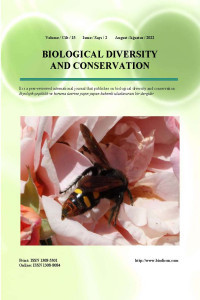Değişken desenli gece kurbağası, Bufotes variabilis (Pallas, 1769)’in erken aktivasyonu üzerine bir örnek çalışma
Amfibiler, çevresel faktörlerden doğrudan etkilenen en savunmasız gruplardan biridir. Nitekim araştırmacılar, türlerin neredeyse üçte birinin neslinin tükenme tehdidinde olduğunu bildirmişlerdir. Ilıman bölgedeki amfibiler normal şartlar altında kış mevsiminde uykuya yatarlar ve iklimdeki dalgalanmalar bu ektotermik hayvanların yaz ve kış aktivitesini dolaylı olarak etkiler. Bu çalışmada, Bufotes variabilis’in kış mevsiminde olağandışı aktivitesi hakkında bir veri sunuyor ve değişken desenli gece kurbağasının küresel iklim değişikliğinden dolayı yıl boyunca aktif olabileceğini değerlendiriyoruz.
Anahtar Kelimeler:
hibernasyon, kış aktivitesi, iklim değişikliği, sıcaklık, Adana
A case study on earlier activation of the variable toad, Bufotes variabilis (Pallas, 1769)
Amphibians are one of the most vulnerable group that are directly affected by environmental factors. Researchers report that nearly one third of species threatened with extinction. Amphibians in the temperate zone hibernate in winter season under normal conditions and fluctuations in climate impact indirectly the summer and winter activity of these ectothermic animals. In this study, we report data on the extraordinary activity of Bufotes variabilis in winter period and evaluated that variable toad could be active throughout the year due to global climate changes.
Keywords:
hibernation, winter activity, climate change, temperature, Adana,
___
- Avci, A., Tuniyev, B., Isailovic, J.C., Lymberakis, P., Andrén, C., Cogalniceanu, D., Wilkinson, J., Ananjeva, N., Üzüm, N., Orlov, N., Podloucky, R., Tuniyev, S., Kaya, U., Nilson, G., Sharifi, M., Papenfuss, T. & Bafti S.S. (2015). Bufotes variabilis. The IUCN Red List of Threatened Species 2015: e.T153571A74506381. http://dx.doi.org/10.2305/IUCN.UK.2015-1.RLTS.T153571A74506381.en .Downloaded on 9 February 2019.
- Carey, C., Alexander M.A. (2003). Climate change and amphibian declines: is there a link? Diversity and Distributions, 9, 111-121.
- Nowakowski, A. J., Watling, J. I., Whitfield, S. M., Todd, B. D., Kurz, D. J., & Donnelly, M. A. (2017). Tropical amphibians in shifting thermal landscapes under land‐use and climate change. Conservation Biology, 31(1), 96-105.4.
- Eksilmez, H., Altunışık, A., & Özdemir, N. (2017). The Herpetofauna of Karçal Mountains (Artvin/Turkey). Biological Diversity and Conservation, 10 (1), 1-5.
- Pounds, A., Fogden, M. & Campbell, J. (1999). Biological response to climate change on a tropical mountain. Nature, 398, 611-614.
- Kiesecker, J. M., Blaustein, A.R. & Belden, L.K. (2001). Complex causes of amphibian population declines. Nature, 410, 681-684.
- Jablonski, D. (2013). Unusual observation of the winter activity of Lissotriton vulgaris from south–western Slovakia. Folia faunistica Slovaca, 18(3), 301-302.
- Vitt, L. J., & Caldwell, J. P. (2009). Herpetology An Introductory Biology of Amphibians and Reptiles. (L. J. Vitt & J. P. Caldwell, Eds.) (3.rd). Burlington: Academic Press.
- Sas, I., & Covaciu-Marcov, S.-D. (2007). Overwintering without winter: the exceptional case of two terrestrial anurans from the thermal habitats in north-western Romania. North-Western Journal of Zoology, 3(2), 121–126.
- Sicilia, A., Lillo, F., Zava, B., & Bernini, F. (2006). Breeding phenology of Bufo viridis Laurenti, 1768 in Sicily. Acta Herpetologica, 1(2), 107–117. https://doi:10.13128/acta_herpetol-1291
- Altunışık, A., & Özdemir, N. (2015). Life history traits in Bufotes variabilis (Pallas, 1769) from 2 different altitudes in Turkey. Turkish Journal of Zoology, 39, 153–159. https://doi:10.3906/zoo-1402-57
- Badpayman, J. M., Nokhbatolfoghahai, M. & Esmaeili, H. R. (2016). Intra-specific variation in Pseudepidalea viridis in Fars province, Iran: Life history and developmental patterns. Iranian Journal of Science and Technology, Transaction A: Science, 40(2), 125–136. https://doi:10.1007/s40995-016-0001-3
- Başkale, E., Sayım, F., Yıldırım, Ş., Atatür, M. K., & Kaya, U. (2011). Reproductive ecology and body size-fecundity relationships of the Green Toad, Pseudepidalea viridis (Laurenti, 1768), in the Kocaçay Stream, İzmir, Turkey. Zoology in the Middle East, 52(1), 39–46. https://doi:10.1080/09397140.2011.10638477
- Castellano, S., Cucco, M., & Giacoma, C. (2004). Reproductive Investment of Female Green Toads (Bufo viridis). Copeia, 2004(3), 659–664. https://doi:10.1643/CE-03-182R2
- Kovács, É.-H., & Sas, I. (2010). Aspects of breeding activity of Bufo viridis in an urban habitat: a case study in Oradea, Romania. Biharean Biologist, 4(1), 73–77. https://doi:10.1103/PhysRevB.61.1795
- Sinsch, U., Leskovar, C., Drobig, A., König, A., & Grosse, W.-R. (2007). Life-history traits in green toad (Bufo viridis) populations: indicators of habitat quality. Canadian Journal of Zoology, 85(5), 665–673. https://doi:10.1139/Z07-046
- Giacoma, C., Zugolaro, C. & Kozar, F. (2000). Temporal spacing of breeding activity in the green toad, Bufo viridis. In: Atti I Congresso Nazionale Societas Herpetologica Italica (Torino 1996), p. 101-108. Giacoma, C., Ed., Mus. reg. Sci. nat. Torino, Ages Arti Grafiche, Torino.
- ISSN: 1308-5301
- Yayın Aralığı: Yılda 3 Sayı
- Başlangıç: 2008
- Yayıncı: Ersin YÜCEL
Sayıdaki Diğer Makaleler
Hatay İlinin Herpetofaunası (Doğu Akdeniz Bölgesi, Türkiye)
Mehmet Zülfü YILDIZ, Burhan SARIKAYA, Mehmet Akif BOZKURT
Otizm: Psikolojik, biyokimyasal ve çevresel faktörlerin değerlendirilmesi
Fatih KAR, Ömer CİHANER, Ceyhan HACIOĞLU, Güngör KANBAK
Karz (Garez) Dağı Florası (Tatvan, Bitlis/ Türkiye)
Ali Murat KESER, Fevzi ÖZGÖKÇE
Gülsen KENDİR, Ayşegül KÖROĞLU
Adana ili Vespidae türleri (Hymenoptera: Vespoidea) üzerine faunistik araştırmalar
Türkiye’den bir Lathyrus cirpicii F.Güneş (Fabaceae) türü
Geopora clausa, Türkiye İçin Yeni Bir Toprak Altı Askomiset Kaydı
Altı Muscari türü (Asparagaceae) üzerine karşılaştırmalı anatomik ve morfolojik çalışmalar
Burcu YILMAZ ÇITAK, Hüseyin DURAL, Tuna UYSAL
